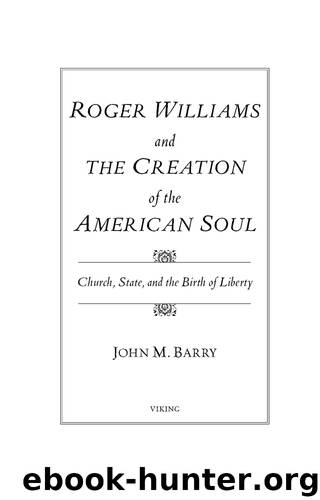Roger Williams and the Creation of the American Soul by John M. Barry

Author:John M. Barry [Barry, John M.]
Language: eng
Format: epub
ISBN: 9781101554265
Publisher: Penguin Publishing Group
Published: 2012-01-04T16:00:00+00:00
CHAPTER 21
Anne Hutchinson was a brilliant, bold, forceful, and self-confident woman. She came by her self-confidence naturally. Her grandfather was a friend of Erasmus, and her father was a Puritan minister outspoken enough to be jailed for nonconformity twenty years before Laud came to power. With a knowledge of Scripture that rivaled any minister’s and with practical skills as a midwife, she knew her own mind and rarely hesitated to speak it.
It was not surprising then that she brought conflict to Massachusetts. But she was not the actual source of that conflict. The source was John Cotton. She was so enamored of his preaching that in England several times a year she had journeyed twenty-five miles to old Boston to hear him. And with her husband and fifteen children, she followed him to new Boston.
In both old and new Boston, Cotton’s sermons left his listeners provoked by his thought, confident of his rectitude, awed by the greatness of God, and inspired to devotion. It was the nature of that inspiration—how to interpret his preaching on inspiration—which now troubled Israel. The dispute surfaced soon after Williams fled Massachusetts; it did not involve him but it had enormous impact on the future of his colony and of his ideas.
Like his colleagues, Cotton preached awe and fear of judgment, but, more than his colleagues, he also conveyed to his listeners not just hope but exhilaration, the heady conviction that God loved them, had chosen them. He convinced them of it with his own passion, his own zeal, zeal made all the more compelling because his erudition and intelligence complemented and subsumed it. His preaching to the heart and emphasis on God’s grace fitted within standard Calvinist and Puritan theology but pushed uncomfortably close to the edges of that theology. Anne Hutchinson pushed her interpretation of his preaching beyond the edge.
The theological question at issue was, as so often seemed the case with Calvinism, predestination. Any brief summary of Puritan theology necessarily oversimplifies it and ignores nuanced views. But the essence of Puritan doctrine can be stated plainly: God would save only a tiny minority of sinners and send the rest to hell, and since all humans were corrupt nothing people did could affect their fate. Only God’s grace was saving.
New England Puritans agreed that those whom God saved went through a well-defined process. The saved first received a “call,” a summons to come to Christ which resonated deep within the soul.
Such persons were then “justified,” chosen by God as “just.” At this step God remitted all sins. They became visible saints. Next the saved were “sanctified”; the grace within them made them holy and righteous. Finally, after death the saved were “glorified.”
In Massachusetts only the saved could become the stones upon which to build a New Jerusalem. Only the saved—the visible saints—could join a church. Hence, after the initial wave of settlement, new church members underwent a rigorous examination process, which helps explain why church members comprised only a small minority of the colony’s population.
Download
This site does not store any files on its server. We only index and link to content provided by other sites. Please contact the content providers to delete copyright contents if any and email us, we'll remove relevant links or contents immediately.
| Africa | Asia |
| Canadian | Europe |
| Holocaust | Latin America |
| Middle East | United States |
Fanny Burney by Claire Harman(26602)
Empire of the Sikhs by Patwant Singh(23084)
Out of India by Michael Foss(16853)
Leonardo da Vinci by Walter Isaacson(13336)
Small Great Things by Jodi Picoult(7140)
The Six Wives Of Henry VIII (WOMEN IN HISTORY) by Fraser Antonia(5515)
The Wind in My Hair by Masih Alinejad(5095)
A Higher Loyalty: Truth, Lies, and Leadership by James Comey(4962)
The Crown by Robert Lacey(4814)
The Lonely City by Olivia Laing(4801)
Millionaire: The Philanderer, Gambler, and Duelist Who Invented Modern Finance by Janet Gleeson(4478)
The Iron Duke by The Iron Duke(4354)
Papillon (English) by Henri Charrière(4274)
Sticky Fingers by Joe Hagan(4198)
Joan of Arc by Mary Gordon(4110)
Alive: The Story of the Andes Survivors by Piers Paul Read(4031)
Stalin by Stephen Kotkin(3965)
Aleister Crowley: The Biography by Tobias Churton(3640)
Ants Among Elephants by Sujatha Gidla(3467)
